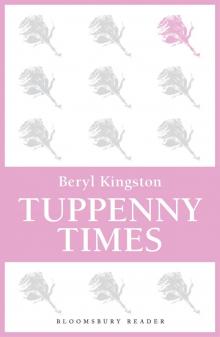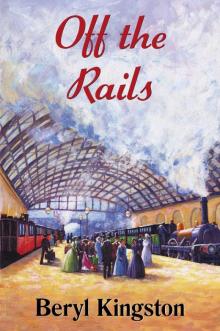- Home
- Beryl Kingston
Gates of Paradise
Gates of Paradise Read online
Gates of Paradise
BERYL KINGSTON
Dedication
I dedicate this book to my dear, dear Roy, who lived with me lovingly for fifty-three years, eleven months and six days; who filled my life with laughter and talk, good food, good sense and magical music; who provided me with accurate research for all my books and finished work on this one six weeks before he died. You are achingly missed, my darling.
‘Mutual Forgiveness of each Vice,
Such are the Gates of Paradise.’
‘The Gates of Paradise’
WILLIAM BLAKE (1757-1827)
Contents
Chapter One
Chapter Two
Chapter Three
Chapter Four
Chapter Five
Chapter Six
Chapter Seven
Chapter Eight
Chapter Nine
Chapter Ten
Chapter Eleven
Chapter Twelve
Chapter Thirteen
Chapter Fourteen
Chapter Fifteen
Chapter Sixteen
Chapter Seventeen
Chapter Eighteen
Chapter Nineteen
Chapter Twenty
Acknowledgements
A Note on the Author
Also by the Author
Chapter One
The Fox Inn, Felpham, April 16th 1852
My dearest Annie,
I do believe I have stumbled upon a mystery concerning our William Blake. At the moment it is merely a suspicion, or perhaps it would be more honest of me to say a hope, since, as you know my dearest, my intention is to discover as many truths as I can about this unfairly neglected man, it being insupportable to me that such a blazing genius should have been given so little attention and so little public acclaim during his lifetime. It may well be that there are truths that have been kept secret and if that is the case I shall do all I can to reveal them, you may depend upon it. To write an honest biography demands no less.
But to begin at the beginning. I arrived here in Felpham in good time and good order, and found it a very pretty place, quiet and rustic and sparsely populated. I can quite understand why Blake called it ‘Sweet Felpham’ and said ‘all Heaven’ was here. I have taken a room at the local inn, which is called ‘The Fox’, not after the animal, as you might imagine, but after a coastguard cutter, a representation of which is painted on the inn sign. It is an old thatched building with a well in the garden and a pump by the back door and uncomfortably old-fashioned, with all manner of unexpected nooks and crannies, uneven floors and a topsy-turvy staircase, which is not at all easy to negotiate by candlelight, as I discovered when I came stumbling up to my room, not five minutes since, after a supper of lamb chops and boiled potatoes washed down with plenty of excellent porter. Ah, you will say, he blames the state of the stairs for his lack of balance instead of the strength of the porter, and you may well be right. However, more to my purpose, and regardless of the strength of the porter, the inn is perfectly placed, for it stands opposite the very cottage where Blake lived for the three years of his stay here, and that is something which is not only opportune but also inspiring, for it is the first of his erstwhile dwellings that is entirely unchanged since the days when he was in occupation. The present tenant is a coastguardsman and not unfriendly. I have arranged to visit him tomorrow afternoon. So you see my dearest, I have wasted no time but have come straight to the heart of things.
I spent this afternoon exploring the village, which is small but compact and consists of three winding tracks, which meander past farmhouses and thatched flint cottages until they reach the church. There are two windmills at the southernmost point of the village, close to the sea, and a row of unassuming houses at the northern end, which have been converted into shops. I found a butcher’s and a baker’s but no candlestick maker’s, and there are also stables, a saddler’s, two smithies and a large dairy, which claims to sell milk, cream, butter and eggs ‘fresh daily’. We will return in the summer perhaps and bring baby with us. I think you would like it here.
The landlord is a bluff but affable man and, mindful of the comfort of his guests, offered that he was willing to answer any questions I might ask. He told me that The Fox had changed hands several times since Blake was here, which is hardly surprising, and volunteered that the landlord in 1800 was a man called George Grinder, who, besides being the owner of Blake’s cottage, also owned a hotel in the nearby hamlet of Bognor, and a plot of land in the village which is called Grinder’s Mead to this day, and was, moreover, one of the witnesses at Blake’s trial. That news encouraged me, so I asked him what else he knew aboat the trial but, to my disappointment, he said he had no knowledge of it at all and nor, I’m sorry to say, did any of the locals who came in to wet their whistles whilst I was eating my supper. The younger ones had no idea that a poet called Blake had ever lived amongst them and those who were old enough to remember him were – or so it seemed to me – peculiarly reticent. One or two recalled that there had once been two poets living in the village, a ‘celebrated’ one, called William Hayley, who had lived at Turrent House, and a ‘mad’ one, who had lived in the cottage, but other than that – their faces and memories were blank. However, just as I was beginning to grow weary of negative answers, one of their number – a farmer called Harry Boniface – told me he could remember the day after Blake arrived and gave me a very clear description of him. It accorded so well with Linnell’s portrait that I wrote it down as near word for word as I could.
‘I recall his first morning here as if it were yesterday. Bright and clear it was, with a strong tide running and the air smelling of sea-salt. Me and Father was off to plough the lower cornfield while the weather held, and as we passed the cottage I said to Father, “Father,” I said, “the gate’s open.” That was odd, do you see, for I couldn’t remember seeing it open before. I was only a little feller at the time. Well, no sooner was the words out of my mouth than out he came, our mad poet himself, with his wife following after, all pink in the cheeks and smelling of yeast on account of she’d been kneading the bread. We had a good fair view of them both. Middling sort of man he was, not over tall but stocky and sturdy looking, with bulging eyes like a hare and a bulging forehead to match. Always wore a wide-awake hat and a blue cloth coat and light brown breeches, with a clean white stock round his neck. He says “Good morning” all warm and friendly-like as if we’d been neighbours for years. So of course we said good morning back and he gave us a smile. Nice smile he had, with a trick of looking straight at you all bright and sharp like a bird. Then off he goes along the path through the field with his wife walking alongside, holding her hat against the breeze.’
I was much encouraged by this, as you can imagine, and ventured to ask him what he remembered of the trial. But then – and I swear to you I was not imagining things – there was such a change in the atmosphere it was as if a chill wind had blown into the room and frozen the words on his lips. He said he had no memory of it at all and then he looked round at all the men in the room and said he doubted whether I would find anyone else who could remember it either ‘after all this time’, and at that there were so many meaning glances and so much nodding agreement that I got the strongest impression that they were warning one another to keep quiet. Have I stumbled upon a secret, do you think? Was there something extraordinary about this trial that the villagers want to keep hidden? Or was this simply evidence of a bucolic mistrust of strangers? I shall pursue it further, you may depend upon it. Meantime, I shall write up such notes as are needful and betake me to my slumbers.
It is nearly midnight and my candle runs low. Take great care of yourself my darling. I will write to you on every occasion.
&nb
sp; This from your loving husband,
Alexander.
P.S. I wish I could discover where Mr Grinder is now, if he is still alive. I am sure he would have a tale to tell. A.G.
18th September 1800
Mr George Grinder, the landlord of The Fox Inn, had been waiting for his new tenants to arrive for more than two hours and he was beginning to weary of it. It was well past eleven o’clock and the regulars were long gone. He’d stoked up the fire in the bar so that he was plenty warm enough, but the candles were burning low and candles don’t come cheap, not even when they’re made of tallow. The potboys dozed in the shadows, Reuben Jones, the village gossip, slept in ‘his’ chair with his chin sunk onto his chest, and Mr Grinder and Will Smith the ostler sat on the settles on either side of the fire, with their feet in the hearth, pipes in their mouths and beer mugs on the table before them, occasionally grunting to one another that time was getting on but otherwise absorbed in their own weary thoughts. It had been a long wait.
‘I’ll give ’em another half hour,’ Mr Grinder decided, removing the pipe from his mouth and pointing at the clock with it, ‘an’ if they ’aven’t come by then, I’m for my bed. There’s no sense sitting up half the night or we shall be like dead things come the morning. They could ha’ stopped along the way and we none the wiser.’
But Will was stirring, sitting up, looking towards the window, his sharp face alert. Wheels were crunching in the street outside and he could hear a pair of horses blowing. The tenants had arrived. Within seconds the lantern had been lit, Reuben and the potboys had woken and all five of them were out in the cold of midnight, breathing in the rousing air as they trudged towards the cottage, ready to give a hand with the unloading.
Mr Grinder’s new tenant sprang down from the post chaise as they approached. He looked as spry and lively as if he’d just woken up in the morning. You would never have guessed he’d just travelled nine and sixty miles through difficult country. The chaise had come to a halt beside the wicket gate and the horses were blowing hard, so Will went to their heads to attend to them. But Mr Grinder strode on to greet his tenants.
‘Mr Blake, sir,’ he said. ‘I’m glad to see you arrived at last. We were beginning to despair of you. You had a bad journey I fear.’
‘No, no,’ Mr Blake said cheerfully, handing his wife from the chaise. ‘’Twas pleasant enough. No grumbling. It took rather longer than we anticipated but ’twas all cheerfulness and good humour. My wife, sir. This is our landlord, Catherine my dear. And my sister, who is another Catherine. Catherine, Mr Grinder.’
‘We’ve had a fire a-burning for you since nine o’clock,’ Mr Grinder told them. ‘Will here’s been keeping it in. There’s logs aplenty in the garden. You’ll see the store. Your flour’s in the larder, ma’am, an’ you can get yeast from the brew house in the morning if you just comes across the road.’
‘You are kindness itself, sir,’ Mr Blake said, giving a little bow.
Mr Grinder took the compliment as earned. ‘Let’s have this gate open, then,’ he said, lifting the latch, ‘an’ we can get your boxes inside. ’Tis too cold a night to be standing about. If you’ll be so good as to hold the lantern Mrs Blake, ma’am, so’s we can see the way.’
There was rather a lot of luggage, sixteen boxes in all – the potboys counted them – and most so heavy it took four men to lift them and there were times when even Reuben had to lend a hand, even though he had a bandage on his foot as proof that overmuch labour was beyond him. But eventually all the boxes were struggled into the cottage, and the two women lit candles and stoked up the fire with fresh logs. Then there was only some sort of wooden contraption left to manhandle. It was wrapped in sacking and Mr Blake said to have particular care of it because it was his printing press and he couldn’t work without it. And at last the job was done, the chaise gone and the four removal men could trudge back to the beery fug of The Fox.
‘What on earth d’he have in all them boxes?’ Will wanted to know, as he damped down the fire. ‘They weigh’d a ton. My ol’ back’s fair creased in two.’
‘Copper plates, so he said,’ Mr Grinder told him. ‘Being he’s an engraver, I s’ppose. Leastways that’s what he’s come down to do, according to Mr Hosier. Engraving.’
‘Just so long as he don’t go a-changin’ his mind and send fer us to carry ’em all out again,’ Will said grimacing. ‘Oi’ve had enough a’ luggin’ ol’ boxes about to last me a lifetime.’
‘He won’t go back, yet awhile,’ Mr Grinder said. ‘Leastways not for three years, that I do know, being as that’s the lease he’s took on the cottage an’ he’s paid good money for it.’
‘Aye, so Oi’ve heard,’ Reuben said, looking sly. ‘Twenty pounds a year, so Hiram was a-tellin’ me.’ His face was so blown about by constant exposure to wind and weather that his features were all over sideways, one eye lower than the other and his nose squashed like a snout in a trough, and a sly expression made him look more grotesque than usual.
‘Well, yes,’ Mr Grinder admitted, ‘that was about the size of it.’
‘Bit steep, wouldn’t ’ee say,’ Reuben teased. ‘Rents was a quarter a’ that, last year.’
‘Last year was last year,’ Mr Grinder said. ‘There are several cottages hereabouts that might have been let for four or five pounds last year but now they’re being furbished up and whitewashed, with a little furniture and stair carpets put into them and they’ll make twenty easy. If Londoners are prepared to pay, let ’em, that’s what I say.’
‘Them’s my sentiments an’ all,’ Reuben said. ‘We don’t want strangers in our village. ’Tent healthy. Let ’em go back to Lunnon where they come from.’
‘Except for this one, eh?’ Mr Grinder said and he winked at the potboys. ‘You two young fellers can rest easy. You won’t be shifting no more boxes for a year or two yet.’
‘Amen to that,’ the potboys said, and the younger one added, ‘Will there be anything else Mr Grinder, sir?’
‘No, no,’ Mr Grinder said. ‘You cut off.’ Then he noticed that the boy was holding a crumpled paper in his hand. ‘What you got there?’
‘’Twas up against the garden wall when we come out,’ the boy said. ‘There’s some printin’ on it. Look.’ And he handed it to the landlord.
It took a while for Mr Grinder to decipher it. He could read well enough most of the time but that was when the paper was smooth and the print clear. This was so smudged and crumpled it required consideration. ‘Well, well, well,’ he said, when he’d made sense of it. ‘Here’s a thing.’ And as his audience was standing about the dampened fire, agog to be enlightened, he read it aloud. “Starved fellow creatures, Come Tomorrow Night with proper weapons in St George’s fields, where You will meet friends to defend Your Rights Never mind the blood thirsty Soldiers We shall put them to flight, The Cause is honourable & ought to be prosecuted as such Rouse to glory ye slumbering Britons.” My stars. I hope this ent the sort of thing our Mr Blake’s thinking a’ printing or he will be in trouble. That’s too radical for the likes of us.’
‘We ought to show it to our Johnnie,’ Will said, gazing at the crumpled paper with some awe. ‘Tha’s what. He’d know what to do about it.’
‘You may do as you please,’ the potboy said. ‘Oi’m for my bed. Tha’s been a long night.’
‘Tomorrow,’ Mr Grinder decided. ‘We’ll show him when he comes in tomorrow. But we don’t none of us say nothing to no one, mind. We don’t want it getting back to Mr Hayley. There’s no point courting disaster.’
Not that their celebrated neighbour would have taken much notice of anything that was said, for at that particular moment William Hayley Esquire was in floods of tears.
The library in his fine new house in Felpham was an elegant room, thirty feet long, furnished in perfectly matched mahogany, and built in the latest style with high curtained windows to let in the light and give a prospect of the sea. The walls were lined with bookcases, glass-fronted to keep out the dust, and his b
ooks were displayed in order of size and importance, Latin writers given prominence to the left of the fireplace and Greeks to the right, as behoved their even more impressive status, for it pleased him to be seen and known as a man fluent in both languages. He had designed the room himself and had spared no expense to achieve the effect he wanted. Not a single item had been omitted nor a single detail overlooked. There was a new mahogany table in the centre of the room rising richly from the blues and reds of a Turkey carpet and set about with four elegant matching chairs. The walls were a fashionable sage green, the doors, windows and fireplace fashionably gilded, the fire well tended. There was a canterbury to hold his newspapers and journals, a Pembroke table for cards and two giltwood pier glasses to reflect the light. It only needed a set of portrait heads above the bookcases – which Mr Blake could start producing as soon as he was settled in – and then it would be complete. It was a room for comfort and display and erudition.
But there was no comfort in it that evening. The celebrated poet sat before the fire in one of his elegant chairs with his handkerchief to his eyes and wept like a child. ‘Two of the best and dearest gone in a single year,’ he mourned. ‘First my dearest Cowper taken so cruelly, and then my own dear darling cripple, my dearest Thomas Alphonso – may his darling name be blessed – my one and only darling son, the apple of my eye, nineteen years old and gone in May of all months – oh, it is too cruel! – gone in May in the first flush of his exemplary youth. And I know you will say ’tis September now but I miss him more keenly than I can express. His loss is insupportable. I cannot bear it.’ He looked the very picture of grief, his dark eyes wet and soulful, his long aristocratic nose dripping with distress, that tender mouth as soft and pink as a girl’s.
‘Try not to grieve so, Mr Hayley, my dear,’ his housekeeper said soothingly, mothering him as she so often did. ‘You will undermine your constitution.’ She knew that was what he required her to say because he liked to be reminded that his constitution was precious and needed care, but if she had given her honest opinion she would have told him she had a great deal more sympathy for the poor child than she had for his father. Poor dear brave Thomas, with that awful twisted spine that pained him so much, he’d not had much of a life of it. Fathered on a young housemaid – and a poor silly creature she’d been – and then raised as though he were a motherless child and with far too much expected of him. She could have wept for him in earnest, but this was not the time or the place. ‘It’s past midnight,’ she reminded her master. ‘Would you not be better to get some rest?’ The warming pan had been in his bed for over an hour now and if he didn’t retire soon she would have to set it with hot coals all over again.

 Everybody's Somebody
Everybody's Somebody Sixpenny Stalls
Sixpenny Stalls Francesca and the Mermaid
Francesca and the Mermaid Avalanche of Daisies
Avalanche of Daisies Tuppenny Times
Tuppenny Times A Time to Love
A Time to Love Octavia's War
Octavia's War Gemma's Journey
Gemma's Journey London Pride
London Pride Gates of Paradise
Gates of Paradise Octavia
Octavia Off the Rails
Off the Rails Maggie's Boy
Maggie's Boy Fourpenny Flyer
Fourpenny Flyer